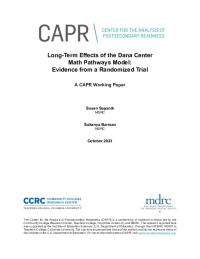Long-Term Effects of the Dana Center Math Pathways Model
Evidence from a Randomized Trial

Community colleges have been struggling for decades to better support the large number of students entering college who are deemed academically underprepared for college-level work in math. Historically, incoming college students who were assessed as needing remedial support to bring their mathematics skills up to college-level standards have been required to take—and pay for—a sequence of one or more semester-length, non-credit-bearing courses, referred to as developmental math courses, before moving on to college-level math. Researchers and practitioners have come to view these developmental math requirements as a barrier to completing college math and obtaining a college degree. Research has found that a majority of students who were identified for developmental math education never completed their developmental sequence or any college-level math credits. Since college-level math is a requirement for the vast majority of college credentials, a lack of successful math completion means a lack of credential attainment for most of these students. Most studies of traditional developmental math education have found that degree attainment and labor market outcomes for students who are referred to developmental courses tend to be no better—and are often worse—than those of similar students who are not referred to them.
As the problems with traditional developmental math sequences became clear, practitioners and policymakers began working on ways to reform the developmental math system to help more students with developmental math needs successfully complete college-level math courses. The Charles A. Dana Center at the University of Texas at Austin was one of the organizations at the forefront of this reform movement, creating the Dana Center Mathematics Pathways (DCMP, formerly the New Mathways Project) with the support of the Texas Association of Community Colleges in 2011. The Dana Center worked with participating colleges to diversify developmental and college-level math course content, separating it into distinct pathways that better aligned with students’ career interests, and shortening the developmental math sequence students were required to take, strengthening the curricula and pedagogy of the developmental math course, and providing additional support for students inside and outside of class. A rigorous random assignment study of the DCMP that was launched in 2014 at four Texas colleges found that the DCMP had a positive impact on students’ completion of the developmental math sequence, increasing both their likelihood of taking and passing college-level math courses and the number of math credits they earned during the first three semesters.
The ultimate goal of programs like the DCMP is to ensure more students who enter college with developmental math needs can successfully progress through college and earn credentials that will support them in the labor market. To that end, this paper discusses the long-term outcomes of the DCMP, which show that the program continued to have a positive impact on students’ completion of their first college-level math course for the five years after random assignment, but did not show significant impacts on students’ overall academic progress (college credits earned), credential attainment, or transfer to a four-year college. The paper contributes to the literature by exploring the effects of a robust developmental math reform model—one that was effective in helping more students complete college-level math (which often acts as a gatekeeper to credential and degree attainment)—on longer-term outcomes of academic progress and attainment.







